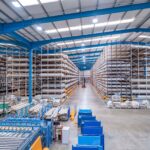Angela Moran, ESG Director at Silentnight, discusses how sustainability and climate consciousness should begin in the workplace and how the changes made to ensure that a business is operating in a sustainable way will support all wider environmental commitments.
With the climate alarm ringing ever louder, it’s imperative that UK businesses take steps sooner rather than later to minimise their environmental impact.
And we recognise that, as a large manufacturer, there’s an increased emphasis on us to ensure that every aspect of our business is run with sustainability at the forefront.
In my last article, I discussed how important accuracy and transparency is for a business as it seeks to improve its environmental offering but practicing holistic sustainable practices is just as important.
So how can businesses ensure that sustainability is integrated into every aspect of a business?
Making operational changes that favour the environment
The last few years have forced companies across the UK to re-evaluate their traditional ways of working, ensuring that all processes are completed with sustainability and efficiency front of mind.
This extends to the vehicles used for distribution. We are regularly reviewing our company fleet, exploring ways to reduce fuel consumption as much as we can. Currently, well over 70% of our company cars are either fully electric or hybrid and we are aiming to raise this to 90% in the next 12 months.
While UK infrastructure makes it difficult for our distribution fleet to become fully electric, we have already replaced a number of our large vans with more fuel-efficient models, and by the halfway point of this year over 80% of our distribution fleet will be newer, more sustainable vans. These vehicles optimise petrol usage while having a lower carbon footprint on the environment compared to previous models.
Maintaining an environmentally conscious workplace
We are also constantly looking at how we can improve efficiencies. Over 99% of electricity consumed throughout the business is via renewable contracts and we have embarked on a number of cap expenditure projects to increase the efficiency of our buildings.
Through metering and data tracking, we have been able to keep our eye on our consumption patterns and this has allowed us to refine our processes and optimise usage.
At the beginning of the energy crisis in 2022, we began to scrutinise consumption habits, launching a company-wide energy awareness campaign. This led to key operational changes that have saved hundreds of kilowatts of energy. These changes allowed us to reduce our overall energy usage by over 30%, even as we continue to increase production year by year.
We are also closely monitoring our water usage with regular tracking and reporting. While we’re not huge water consumers, it is important for us to save where we can. That can be through recycling water when cleaning our vehicles, or by making our bathrooms more water efficient – even the smallest changes can make a big difference.
Our newly refurbished bathrooms also have low-flush toilets and push taps – both of which use significantly less water than their conventional counterpart. Low-flush toilets use at least 30% less water and push taps reduce water usage by up to 50%.
Sourcing materials responsibly
As one of the UK’s largest manufacturers, it is in our best interest to ensure that all materials used in our products are obtained in an environmentally conscious, socially responsible and economically viable manner. That’s even more important with consumers and stakeholders increasingly aware of and concerned about where their products are made.
Like with a lot of our sustainability practices, through constant monitoring and evaluation of our supply chain, we continue to find new ways to reduce our environmental impact through responsible sourcing without sacrificing the comfort and quality that are synonymous with our brand.
Through this we have found that over 90% of our carbon emissions lie in our supply chain. That’s why reducing emissions associated with the production and transportation of materials, and ensuring the materials we use are recyclable, is a strategic focus for us.
This focus has allowed us to reconsider the materials we use to ensure that they are not only durable but recyclable too. For instance, 70% of our domestic range is made from materials which are inherently low in flammability. By eliminating the need for additional flame-retardant chemicals, we’ve been able to significantly improve recyclability options post-consumer use and where we have been unable to use flame-retardant materials, our long-term partnership with UCLAN university has enabled us to drive innovation in novel treatments.
We’ve also made changes to our plastic and cardboard packaging, as well as the sourcing of polyester, steel and timber, to ensure maximum recyclability and reduce our environmental impact.
As more businesses move towards more sustainable practices, it is important that these practices are holistic. Not only does a holistic approach to sustainability positively affect our brand reputation and consumer loyalty – but it allows us to remain steadfast in our net zero journey, ensuring that we are doing all we can to reduce environmental impact across the board.















